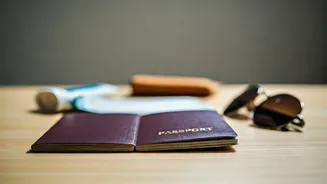Protect Your Passport
Your passport isn't just an ID; it's your key to international travel, and protecting it should be a top priority. One crucial step is to avoid any damage.
Keep it dry and protected from extreme temperatures, as these can easily ruin the document. Always store your passport in a secure location when you're not using it, such as a hotel safe or a zipped compartment within your luggage. Don't leave it unattended, especially in public places. Additionally, consider making copies of your passport's information page. Keep these copies separate from the original, both physically and digitally. These copies can be invaluable if your passport is lost or stolen. You should also share copies with someone you trust. In case of theft or loss, they can greatly assist in replacing your passport.
Avoid Expired Passports
A significant error many travelers make is traveling with an expired passport, or one that is close to expiring. Most countries require your passport to be valid for at least six months beyond your planned stay, so checking the expiration date well in advance is essential. Renew your passport well before you plan to travel. Processing times for renewals can vary, and unexpected delays are common. Start the renewal process as early as possible to avoid any last-minute stress or the risk of missing your trip. Research the passport requirements for all countries you plan to visit, as they might have specific validity rules. Some countries demand more than six months of validity, so it's best to be informed before you book your trip. Also, be aware of emergency passport services if you need to travel urgently; understanding these options beforehand can save you time.
Don't Lend Your Passport
Never lend your passport to anyone, regardless of the reason. Your passport is a personal document meant only for your identification and travel. Lending it can lead to identity theft, fraud, or even legal issues, and the repercussions can be severe. It is never wise to hand over your passport for any reason. If someone asks to borrow it, decline politely but firmly. Instead, offer an alternative form of identification, like a driver's license. If you require assistance, involve a trusted travel companion or contact official authorities for help, and be cautious about who has access to your passport details. Always safeguard the document yourself.
Avoid Illegal Alterations
Tampering with your passport is a serious offense that can have dire consequences. Never make any alterations or modifications to your passport. This includes changing any information, removing or adding pages, or even trying to repair damage yourself. Any tampering makes your passport invalid and could lead to you being denied entry into countries, facing arrest, or incurring hefty fines. Keep your passport in good condition. If it is damaged or worn, get it replaced immediately through the official channels. Any changes made by unauthorized individuals render the passport useless. If you need to correct information, follow the formal procedures to update it through the passport issuing authorities.
Be Wary of Scams
Protecting your passport from scams is another critical aspect of safe travel. Always be vigilant about potential scams and fraudulent schemes, especially in tourist areas. Be cautious when approached by strangers offering to help with your passport. They might offer to expedite services, or even suggest that your passport needs to be replaced. Verify the legitimacy of any service provider before handing over your passport or any personal information. Always rely on official passport services or trusted travel agencies. Never share your passport details or personal information online with unverified sources or through unsecured websites. Keep your personal data secure. If you suspect fraud, report it immediately to the local authorities and your country's embassy or consulate.
Don't Use Stolen Passports
Using a stolen or lost passport, or even someone else’s passport is a serious crime that has legal and safety implications. If your passport is stolen or lost, report it to the authorities immediately. Using a passport that isn't yours can lead to severe penalties, including detention, deportation, and potential prosecution. Moreover, you could be mistaken for someone with a criminal record or on a wanted list. The same applies if you find a passport; report it to the appropriate authorities. Do not attempt to use it or give it to anyone else. By following these guidelines, you protect yourself from serious legal consequences and ensure the security of international travel.
No Unauthorized Entry
Do not attempt to enter a country illegally or use your passport to enter a country under false pretenses. Respect all visa requirements and border control procedures for any country you plan to visit. Failure to adhere to these rules can result in denial of entry, detention, or even deportation. Always comply with immigration and customs regulations. If you attempt to enter a country illegally, you may face severe penalties. Ensure all your documentation is up-to-date and valid. If you have questions about entry requirements, seek clarification from the country's embassy or consulate before you travel.
Mind Social Media
Avoid posting photos of your passport online, and be careful what information you share on social media. Sharing your passport details or a photo of your passport online can expose you to identity theft and fraud. Criminals can use this information to create fake identities or commit financial crimes. Be cautious about the information you share on your social media profiles. It's best not to reveal travel dates, flight details, or specific locations, as this can make you a target for theft. Be mindful of the privacy settings on all your social media accounts, and restrict access to your personal information. When traveling, keep your travel plans private until your return.












